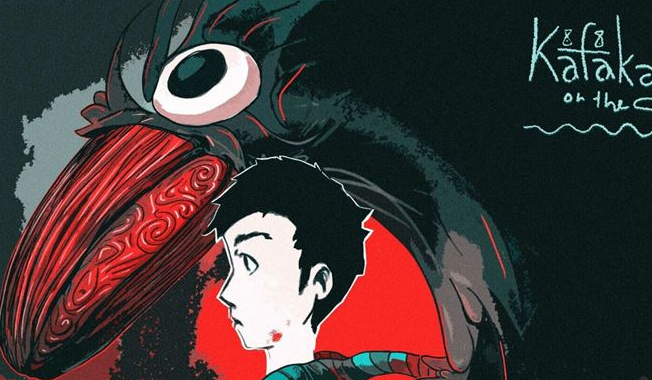‘Kafka On The Shore’ by Haruki Murakami: A Symphony of Dream & Fate
Imagine sitting by a fireplace with a warm blanket and sipping on a decedent mug of hot chocolate on a cold winter evening. Imagine a warm hug when you are at your lowest. Imagine standing barefoot on the beach while the soil is pulled away by waves. Imagine the smell when rain drops fall on earth. This book is all that and more.It delves into fate’s whispers, the labyrinth of identity, and the echoes of memory, weaving a dreamscape where reality dissolves, and characters confront the mysteries of their souls.
“Kafka on the Shore” was released in 2002 in Japan. It was translated in English by Philip Gabriel, and that version was published in 2005 making it accessible to a global audience. Kafka on the Shore is Murakami’s 10th book. It is widely considered one of his most ambitious and acclaimed novels. It is famous for its mesmerizing magical realism, philosophical depth and open-ended mysteries. It captures universal themes like identity, fate and memory; making it a global literary sensation and of Murakami’s most celebrated works. It was featured among “The best 10 books of 2005”.
Kafka Tamura, a fifteen-year-old boy with a storm inside, runs away from his Tokyo home, haunted by a dark prophecy, a curse whispered by his father: he will kill his father. Carrying only a few belongings and a copy of “Kafka on the Shore”, he seeks refuge from his fate, yet unknowingly steps straight into its shadow. His journey leads him to a quiet seaside town and the mysterious Komura Memorial Library, run by Oshima, a sharp-witted, philosophical assistant, and Miss Saeki, a ghost of a woman whose tragic past lingers like a forgotten melody.
Far away, Nakata, an old man touched by the extraordinary, navigates a life stripped of memory. Ever since an inexplicable event in his childhood left him unable to read or reason as others do, Nakata has lived simply; except for one unique gift: he can talk to cats. His quiet life is disrupted when he encounters a violent act, one that sets him on a strange and winding path toward a destiny he doesn’t understand but feels compelled to follow.
As Kafka unravels his own identity, he is pulled deeper into Miss Saeki’s haunted world; a world where time warps and memories bleed into the present. He becomes entangled in her sorrow, her music, and a mysterious painting that seems to mirror his life. Meanwhile, Nakata’s journey takes him through surreal encounters: a conversation with cats, a rainstorm of fish, and an enigmatic man named Johnnie Walker, whose eerie mission pushes Nakata to commit an act of violence that sets cosmic forces into motion.
These two lives, Kafka’s and Nakata’s flow like rivers destined to meet, though they never physically cross. Kafka, consumed by guilt and desire, is drawn into a forest where time loses meaning. Nakata, guided by instinct, seeks to “close the entrance stone,” a metaphysical portal that has been opened between worlds. Alongside him is Hoshino, a truck driver who initially helps out of pity but soon becomes a believer in Nakata’s inexplicable wisdom.
As Nakata’s journey nears its end, he fulfills his role, but it costs him his life; a quiet, serene departure as if he has completed his part in the grand design. Hoshino, left to continue, takes up Nakata’s mission, closing the entrance stone and restoring balance.
Meanwhile, Kafka faces his own reckoning. In the surreal heart of the forest, he confronts the dark prophecy hanging over him. Through visions of his parents and the spectral presence of Miss Saeki, he comes to terms with his fears, his desires, and the inevitability of fate. He awakens from the forest transformed; not freed from his past but reconciled with it, ready to return to the real world.
In the end, “Kafka on the Shore” is not about finding answers but about accepting life’s mysteries. It is a story of loss and longing, of fate and free will, of parallel worlds where the boundary between reality and the subconscious dissolves. The novel lingers like a haunting dream, its meaning shifting with each turn of the page, inviting readers to lose themselves in its melody.
This is what Murakami said in an interview and I couldn’t agree more. “Kafka on the shore contains several riddles, but there aren’t any solutions provided. Instead several of these riddles combine and through their interaction the possibility of a solution takes shape. And the form this solution takes will be different for each reader. To put it another way, the riddles function as part of the solution. It’s hard to explain, but that’s the kind of novel I set out to write.”
Well, to be honest, even in retrospect, this book isn't very clear. But, does it have to be? Not everything always has to make sense. Some things are meant to be felt, and only that. Start to finish this book is ambiguous; it's a mystery, a fantasy, a deep but thinning line between what's real and what's not, taking us to a point where we can't tell one apart from the other, and finally to a point, where we don't care about separating reality from fantasy. Magical realism takes a very strange, taboo, triggering kind of turn in this book. There are moments in the novel that might render you highly uncomfortable, even though they are written with ease, and with a melancholic kind of love. What I love about Murakami is that he doesn't write with morals or structures. He writes to write. To tell stories that perhaps have half a shadow (like characters in his book), to express, but most importantly to create his own world of pop culture references, and one where his characters can breathe without any judgment for being human, no matter how terrible they are in the eyes of the society, or themselves for that matter.
This book doesn't want to be right, it doesn't want to purposely fight the right and be wrong either; this book just wants to BE. You know what I mean? It's poetic but it's grounded in reality and also flies high in fantasy but mostly just hovers over the thinning line between the two. I love this book as much as I love Norwegian Wood. There's a certain magic in the way Murakami uses and forms his words and sentences, and even though I can't quite describe the magic, I know I love to bask in it, and that truly is enough for me.The most precious thing I learnt from Murakami was that there may not be an answer but love is the way. And that's the Murakami Magic. All the magic, music, romance and yearning, Murakami churns tales so beautiful and enchanting that it will fill you up to the brim. Often his stories don't have a definitive conclusion, but there's something transcendental in them, and that is love.





